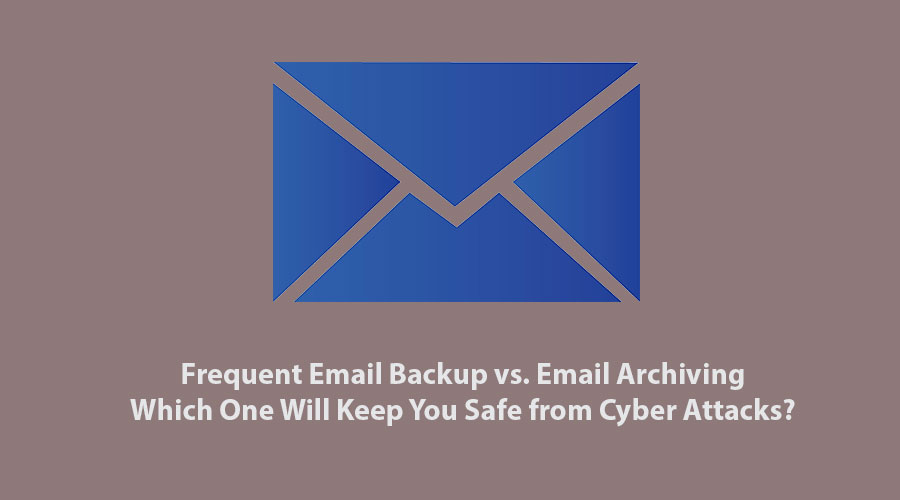
In today's digital age, where cybersecurity threats are rampant, having a secure email management system in place is no longer a luxury but a necessity.
Emails often contain sensitive information, making them a prime target for cybercriminals. That's why understanding the concept of email backup and email archiving and their roles in cybersecurity is crucial.
Demystifying Email Backup and Email Archiving
The first step to deciding between email backup and email archiving as your cyber-attack defense strategy is understanding what each process involves.
These two strategies, while serving similar primary purposes of data protection and preservation, differ significantly in their methods, applications, and efficiency levels.
The What and Why of Email Backup
Email backup is the act of making a duplicate copy of the content of your emails and storing them securely in an alternative location.
The primary goal here is to mitigate risks associated with data loss, which might occur due to a variety of factors such as server crashes, accidental deletions, hardware failures, or malicious activities like cyber-attacks.
- Scheduling: Email backups usually operate based on a schedule, be it daily, weekly, or monthly. The timing of these backups captures the state of your email data at that specific instance, akin to a time-stamped snapshot. This aspect is beneficial in restoring data to a particular point, primarily in disaster recovery scenarios.
- Storage: The data gathered during backup is typically stored in a compressed form to save storage space. This compression, while beneficial for storage economy, can make retrieving specific information somewhat challenging and time-consuming.
- Application: While email backups provide a safety net for data loss, they are not designed for frequent data access and may fall short in terms of providing efficient data retrieval for ongoing cybersecurity investigations.
The Ins and Outs of Email Archiving
Email archiving, conversely, refers to the system of automatically capturing, indexing, and storing all inbound and outbound email communications.
The continuous nature of email archiving makes it significantly more comprehensive than email backup since it ensures no data, however trivial, is ever overlooked or lost.
- Accessibility: Email archiving solutions are typically equipped with robust search and retrieval capabilities, designed to handle frequent data accesses. This feature enables you to locate and retrieve specific emails quickly, making it an efficient tool for routine data management and cybersecurity investigations.
- Authenticity: One distinguishing feature of email archiving is that archived emails are usually stored in an unaltered, read-only format. This format ensures the authenticity and integrity of the data, which is crucial in legal scenarios where data tampering could have severe consequences.
- Security: Archiving offers a higher level of protection against data tampering or loss. Its consistent tracking and storage of every email, coupled with the read-only format, means that even if your live data is compromised, you have a secure, unaltered record of your communications. This is particularly valuable when dealing with sophisticated cyber threats that might attempt to alter or erase traceable evidence.
In sum, while both email backup and email archiving are integral to a well-rounded data protection strategy, they each have unique attributes that make them better suited to different scenarios and requirements.
Exploring the Role of Email Archiving in Cybersecurity and Incident Response
Email archiving does more than just preserve your emails for posterity; it plays an integral role in fortifying your cyber defenses and aiding in incident response should a breach occur.
By continuously cataloging all email data, it provides a comprehensive and tamper-proof record of communication that can be invaluable in both proactive cybersecurity measures and reactive incident handling.
Safeguarding Data From Loss and Tampering
Email archiving offers a robust shield against cyber threats, primarily through its protection against data loss and tampering. The significance of this protection cannot be understated in today's digital age, where information is an organization's most valuable asset.
- Tamper-proof storage: Since archived data is stored in a read-only format, it cannot be altered or accidentally deleted. This attribute is particularly beneficial in providing protection against threats aimed at modifying or erasing data, including those from both inside and outside the organization.
- Constant monitoring: The continuous process of archiving ensures that every single email is securely stored and can be retrieved if needed. This constant monitoring provides a safety net against data loss, even if the live data is compromised.
- Cybersecurity defense: The stored emails can act as an early warning system for detecting cyber threats. By analyzing email traffic and content, abnormalities or suspicious activities can be identified and mitigated before they escalate into significant security incidents.
Enhancing Incident Response and Recovery
In the aftermath of a cyber-attack, email archiving proves to be a potent tool in incident response and recovery. The archived emails can provide an accurate, time-stamped trail of events leading up to the breach.
- Tracking cyber threats: A complete archive can help cybersecurity professionals track the progression of an attack, such as a phishing campaign, or identify the source of malicious software.
- Incident resolution: The archived data can be invaluable in resolving the incident by pinpointing the affected areas and guiding the recovery process. The ability to quickly retrieve specific emails can speed up the response time, minimize damage, and get operations back on track faster.
- Post-incident analysis: After the incident has been resolved, the archived emails can be analyzed to understand how the breach occurred and what security measures failed. This information is vital in strengthening the security infrastructure and preventing future incidents.
Meeting Compliance and Legal Requirements
The role of email archiving extends beyond cybersecurity to include ensuring regulatory compliance, especially in industries like healthcare, finance, and others dealing with sensitive data.
In the event of a cyber-attack, a comprehensive email archive can prove instrumental in any subsequent legal investigations.
- Regulatory compliance: Various regulations mandate the preservation of communication records, including emails, for a certain period. An email archiving solution can automate this process, ensuring compliance and reducing the risk of non-compliance penalties.
- Legal support: In the event of a cyber-attack or data breach, your email archive could serve as crucial evidence during legal proceedings. It can prove that you took reasonable measures to protect your data and may help identify the attackers.
- Incident disclosure: A detailed archive can also aid in incident disclosure requirements, providing accurate information about the scope and impact of the breach. This transparency can help maintain trust with clients and stakeholders and comply with regulations that require breach notifications.
Comparing Email Backup and Email Archiving in the Face of Cyber Threats
Having examined email backup and email archiving separately, let's compare their effectiveness in mitigating cybersecurity threats.
Accessibility and Searchability
Email archiving, with its advanced indexing and search capabilities, outperforms email backups when it comes to accessing and retrieving specific data, which is crucial during a cyber incident investigation.
Data Integrity
In terms of data integrity, email archiving provides a higher level of assurance since all emails are stored in an unalterable, read-only format. Backups, in contrast, are more susceptible to data loss or alteration due to their less secure storage format.
Efficiency in Incident Response
In the face of a cyber-attack, email archiving proves to be more efficient. With its complete record of all emails, archiving enables faster and more effective incident response, helping to identify, contain, and recover from cyber threats.
Final Thoughts
While both email backup and email archiving have their benefits, when it comes to protecting against cyber-attacks, email archiving comes out on top. Its superior searchability, data integrity, and efficiency in incident response make it a vital tool in modern cybersecurity strategy.
In today's digital landscape, safeguarding your email data is not just about preventing data loss—it's about bolstering your defenses against the ever-increasing threat of cyber-attacks.




